“We set a goal to bring officials into contact with our audience, acted as mediators in the project, and we can see from the attendance that people liked this format!”
The Head of the Chernivtsi-based A.C.C. TV and Radio Company, Oksana Danyliuk, is convinced of this. Her media took part in the project initiated by the National Union of Journalists of Ukraine (NUJU), which was designed to promote the interaction of publications with the audience and representatives of local communities.
The goal is to better understand the needs of the audience.
Within the work on projects, newsrooms receive assistance from the Ukrainian Media Fund with the assistance of the German Marshall Fund of the United States. A total of 21 TV and radio companies, and online and print media are participating in the project.
All projects are unique. The Kherson-based X.ON radio decided to popularize its X-Men show, and, with the help of social networks, the broadcaster involves listeners in discussing the pressing problems of the city, and thus bring their opinions to the attention of state institutions. Radio broadcasts become a platform for voicing the positions of both the residents of Kherson and the Kherson Region, as well as local authorities. The project is also valuable because it attracts residents not only of the liberated, but also of the occupied part of the region.
“Anyone is important for Kherson and useful for Kherson!” the manager of the X.ON radio, Kateryna Tsymbaliuk, is convinced. “We even invented the term ‘Khersonization’….”
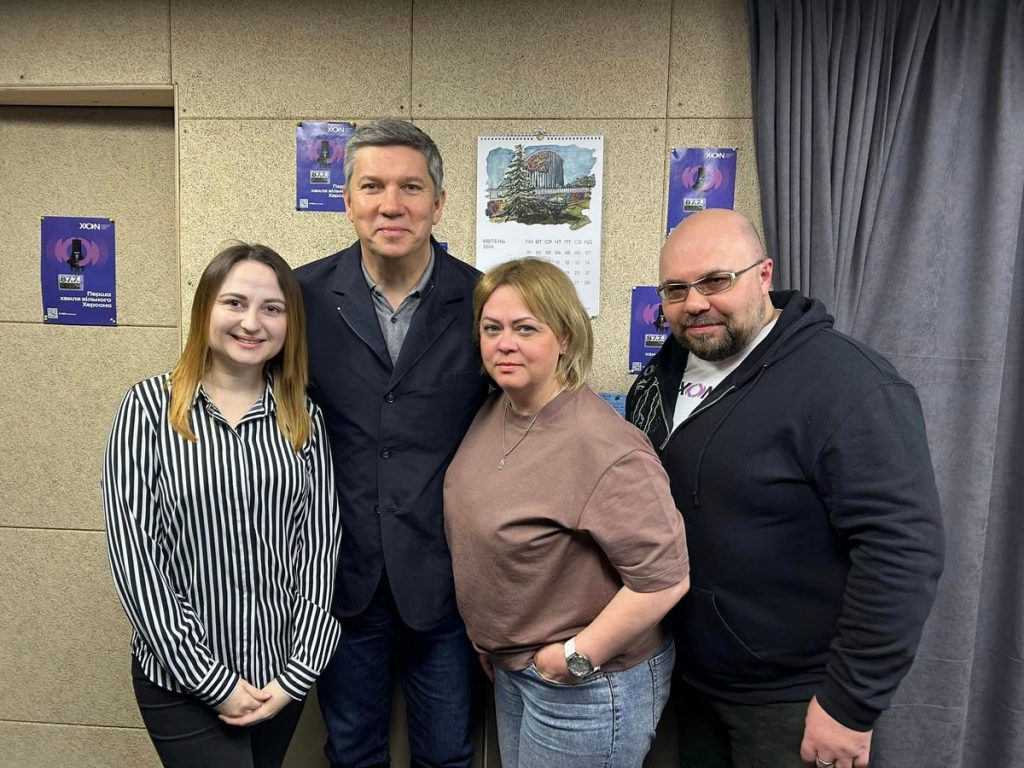
The Chernihiv-based newspaper, Visnyk Ch, which is one of the most circulated (if not the most circulated) printed publications in Ukraine, used a survey of its audience in order to work out the technology of increasing the visibility of its publication in the Chernihiv Region by improving the selection of topics. They called their project What’s up here?
“We’ve interviewed activists, posted questions in local groups, on news sites and community pages on social networks. Four topics were singled out: benefits, mobilization, land issues, and decommunization,” said journalist Maryna Zabiyan. “We plan to spread the acquired experience to the entire region.”
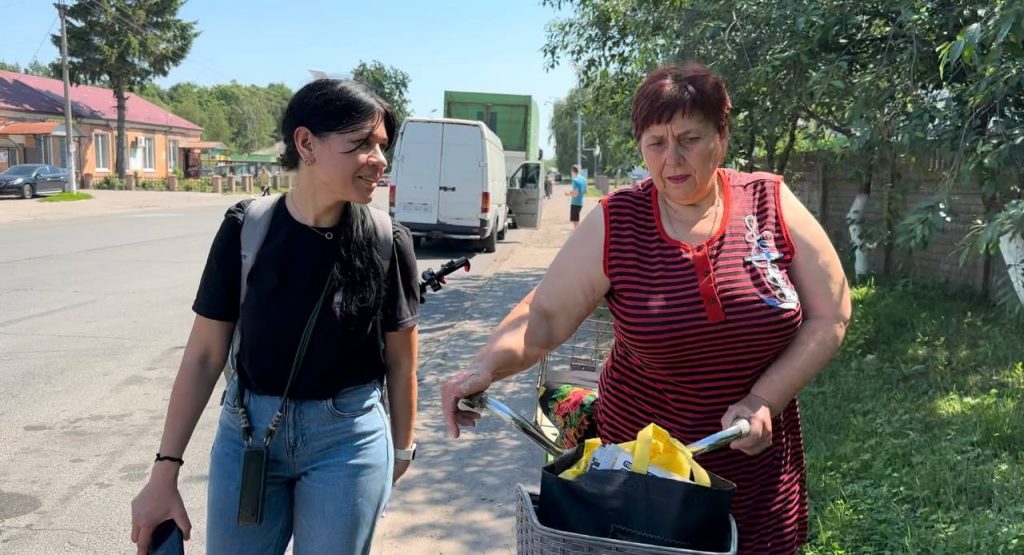
A number of media outlets conducted in-depth audience surveys to study readership needs and generally find out who reads the media and why. Such studies of the needs of the audience have given publications an increase in attendance and new topics for materials.
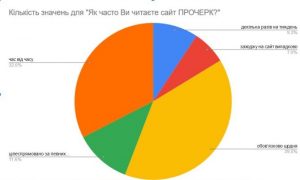 “Although such surveys are not representative, we consider them more like an interview with our readers in order to find out their needs,” says Nazarii Vivcharyk, the editor of the Cherkasy-based Internet publication, Procherk. “Most of the survey participants (41.9%) are young but already experienced people aged 31 to 45. The second largest audience is more respectable – 46-60 years old (34.9%). The remaining 23.2% are those under 30 and those over 60. Women were more active than men: more of them took part in the survey. Many other indicators were also found, such as the time spent on the site or topics that concern readers, such as local government news, politics, security, and the culture that broke out in the leaders… Someone wants more reports and stories about people, and someone asking for more sports news.”
“Although such surveys are not representative, we consider them more like an interview with our readers in order to find out their needs,” says Nazarii Vivcharyk, the editor of the Cherkasy-based Internet publication, Procherk. “Most of the survey participants (41.9%) are young but already experienced people aged 31 to 45. The second largest audience is more respectable – 46-60 years old (34.9%). The remaining 23.2% are those under 30 and those over 60. Women were more active than men: more of them took part in the survey. Many other indicators were also found, such as the time spent on the site or topics that concern readers, such as local government news, politics, security, and the culture that broke out in the leaders… Someone wants more reports and stories about people, and someone asking for more sports news.”
The Lviv newspaper, Vysokyi Zamok, has prepared a series of polls on the Facebook social network on the topic of What Do Readers Lack?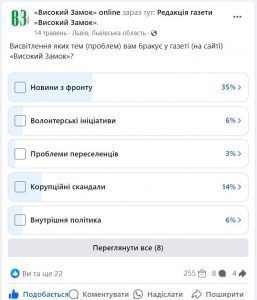
“The first survey determines the number of respondents who read the paper version of the publication. Based on the results of this survey, we learned that 25% of regular readers of our Facebook page also read the paper version of the Vysokyi Zamok newspaper at the same time. This is a very optimistic result, which we did not expect and which inspired us. This shows that the paper newspaper has its readers, despite the active development of social networks, so it has prospects,” says the editor-in-chief of the Vysokyi Zamok newspaper, Nataliya Baliuk.
In the second survey, the publication identified topics that readers lack. According to this survey, the audience is most concerned about news from the front. The next topic that worries readers is corruption scandals, and in third place are prices for utility services…
Zakarpattia online publication, PMG.ua, also conducted a survey of readers. According to Ivan Harahonych, the editor-in-chief of the publication, the labor market in the region interests the most readers of the publication.
A social media survey conducted by the Odesa publication, Novynar, was also aimed at studying its audience. According to the editors, this made it possible not only to improve communication between the readership and the authorities but also to increase site visits by 10%. Approximately the same increase is recorded in the All-Ukrainian newspaper, Dialog. The Chernivtsi newspaper, Pohliad, expects to increase the number of subscribers by 20% based on the results of subscriptions for the second half of the year.
The Kramatorsk publication, Technopolis (Donetsk), also managed to expand its readership; in particular, it added subscribers to its Facebook page. “But the most important result of our project is the activation of communication with the audience, with members of our community: a large number of views, involvement in the project, comments, calls from readers who suggested their topics for materials,” the publication emphasizes.
Ternopil-based TV-4 attracted a new audience by placing materials on the sites and in community groups participating in the project.
The Volia Narodu publication from Busk, Lviv Region, emphasizes the importance of the project’s return to the newspaper pages of topical materials that concern the community.
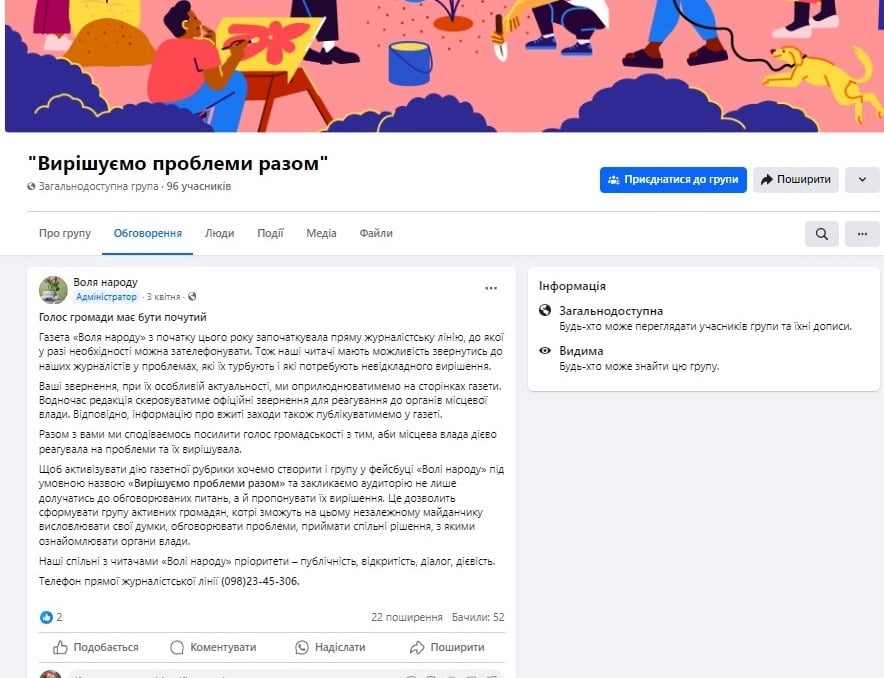
Speakers, who are difficult for journalists to reach, were asked questions…
The publication from the Kherson Region’s Novyi Den pays a lot of attention to feedback from readers. The newsroom is actually under evacuation, but it has already managed to hold four telephone “hotlines” with the audience to identify the most painful topics regarding what worries the people of Kherson.
“Newspaper – reader – newspaper – this is the name of the new working strategy. We literally go to the reader,” said editor Anatolii Zhupyna. “In general, in the conditions of war, it is almost impossible to conduct the classic “hotline” to which we are accustomed when a journalist sits with a specialist and takes phone calls. You understand: the region is being bombed, people are dying, so people don’t gather like they did in peacetime. That is why we placed our phone numbers in the newspaper on the website – people can call and ask questions. At first, readers were not very trusting; they did not actively call, but after the first “hotline,” they started calling more.”
Journalists meet with readers’ live.’
“We drove around the villages when we saw several people, we stopped and talked. Just on the street! They asked what worries them the most… This is how they collected dozens of questions from people and then handed them over to the head of the military administration, the management of the Pension Fund in the Kherson Region. They gave answers,” Anatolii Zhupyna said.
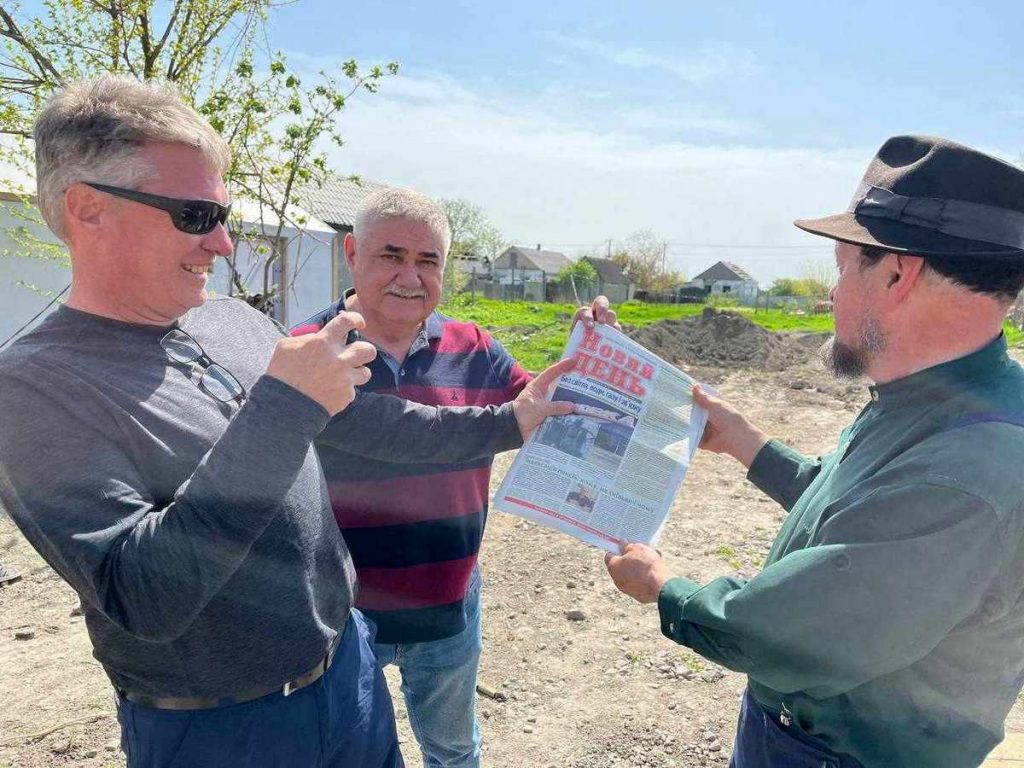
People talked about the problems in rebuilding destroyed houses and asked who to contact if the builders allowed defects. They also complained about the gas cut in high-rise buildings, where some of the apartments are empty. “But there are those where the inhabitants remained. What should we do?” readers asked.
In addition to working in text format, the newspaper also publishes videos from trips on its platforms. So, the material about the trip to the village of Pravdyne has already received almost 3,000 hits.
Instead, Chernivtsi-based A.C.C. Media Agency collected questions from readers on social networks. The received questions were directed to the speakers, who are difficult not only for ordinary citizens but also for journalists to reach.
“The list of potential speakers of the project was identified, to whom the questions of A.C.C. Media Agency readers were addressed in the future. Work on each issue began with the publication of an announcement, with the introduction of a speaker to whom readers could leave their questions in the comments on social media pages. In total, four publications were created with the announcement of the participation of four speakers, said the director of A.C.C. Television and Radio Company LLC, Oksana Danyliuk.
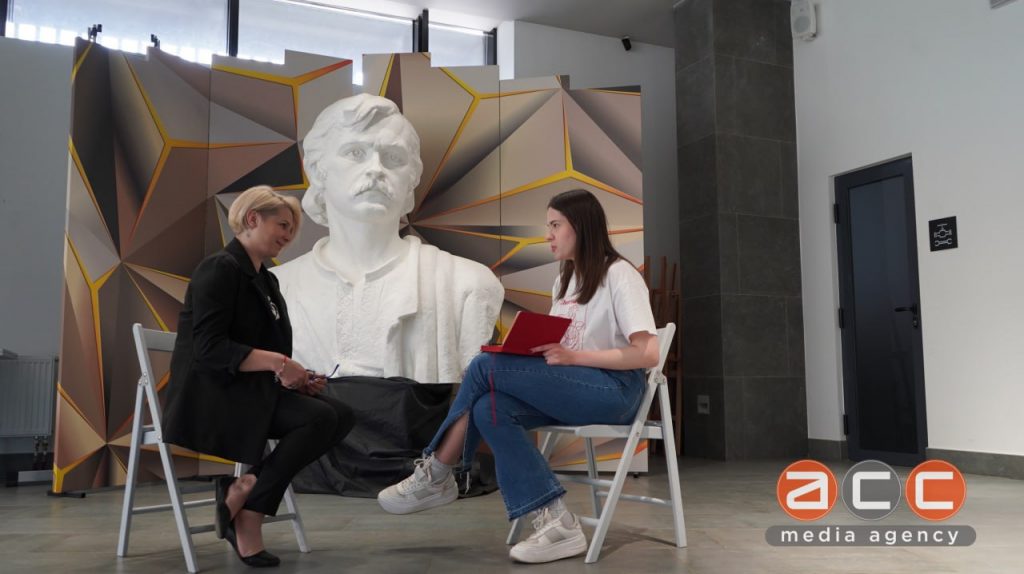
The speakers were one cultural figure, deputies of the Chernivtsi city mayor, and the head of the Chernivtsi Regional Military Administration.
A similar project was implemented by the Ivano-Frankivsk television and radio company, RAI. She has organized ten meetings with key audience speakers as part of her Power Of The Word and A New Viewpoint shows. According to Andrii Rusyniak, the founder and director general of the television and radio company, thanks to the project, it was possible to restore the format, which had been suspended since the beginning of the full-scale invasion due to lack of funds.
“In this way, currently reanimated programs have a chance to move forward,” says Andrii Rusyniak.
Visnyk+K in Lutsk celebrates the positive result of the project implementation. “Thousands of our readers were able to get answers to pressing questions. And people from remote villages of Volyn communities did not have to travel dozens of kilometers to see specialists,” the journalists of the publication claim. Lviv-based Leopolis.news says about the significant public resonance of their project: they managed to attract city council members and a representative of the Commissioner for Human Rights of the Verkhovna Rada of Ukraine to cooperate.
Communication gave results!
The Visti Barvinkivshchyny newspaper (Kharkiv Region) decided to study the opinion of the community regarding current problems.
“During the two days of the survey, we collected 531 votes,” said editor Iryna Stolbova. “It exceeded all expectations and forecasts! With their answers, people expressed their vision of solving the problem of improving the territory of our community.
According to the results of the survey, 18% of votes were in favor of involving more unemployed citizens in the works on the improvement of territories. The journalists discussed this opinion with the management of the Barvinkove Employment Service. The materials were printed in the Visti Barvinkivshchyny newspaper.
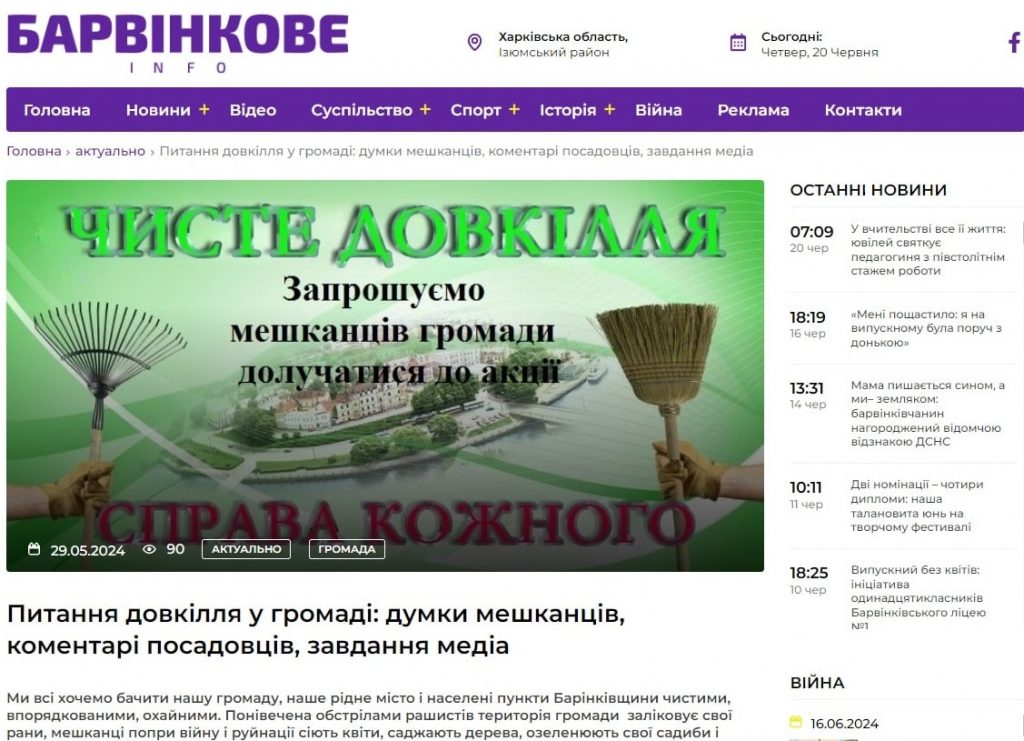
In turn, the Sarnenski Novyny newspaper (Rivne Region) involved the public in discussing the problem of reducing the number of homeless dogs in the community’s settlements.
“The effectiveness of the publications is obvious,” said Svitlana Liashko, the editor-in-chief of Sarnenski Novyny. “The number of those willing to help zoo volunteers immediately increased. There is cooperation with the city council in matters of sterilization of homeless animals. Most citizens understand that this problem is created precisely by people who are irresponsible towards those they have domesticated.”
On the other hand, Nikopol-based Nostalzhi radio, conducting “hotlines” in its front-line region, made psychological support of its listeners its main task.
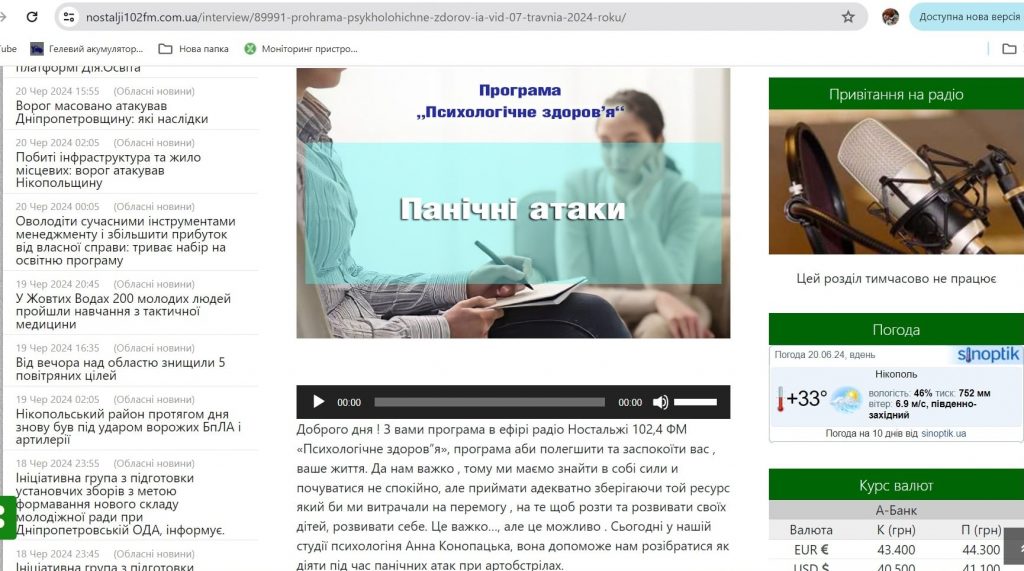
“Our creative team believes that we have helped radio listeners become calmer with our psychological programs on the air,” says journalist Olena Halyna. “We provided psychological advice for those who live under daily shelling and supported the psycho-emotional stability of our radio listeners.”
Some publications have found creative ways to communicate with their audience.
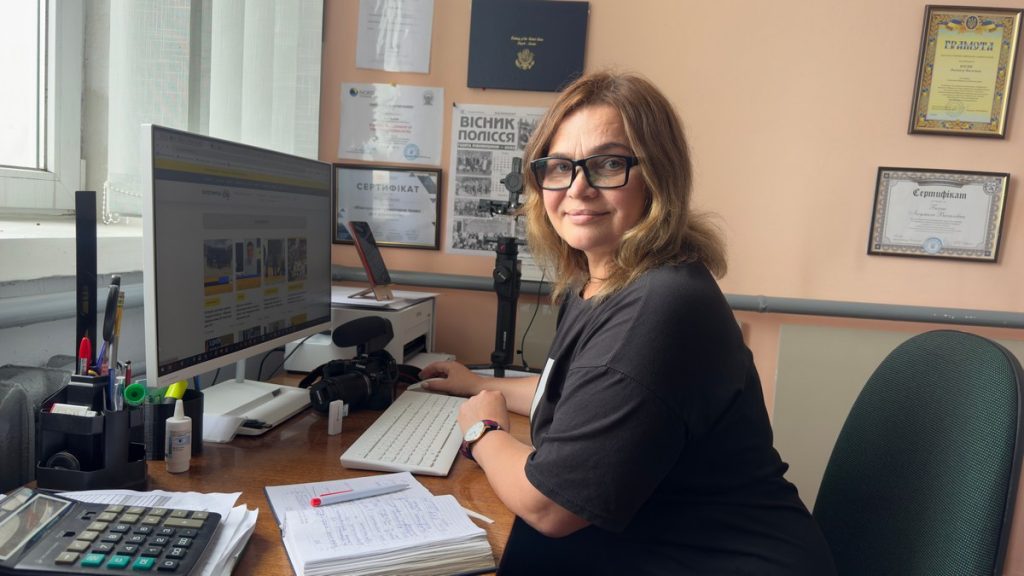
“We installed boxes for collecting appeals at 20 newspaper sales points in Volodymyrets and developed a Google form for appeals on the Volodymyrets.City website. Besides, we filed an appeal in the printed weekly publication Visnyk Polissia. In May, 21 appeals were received,” says the acting director of Volodymyretsky Visnyk LLC, Liudmyla Bosyk.
Communication with the community gave results; for example, the number of Telegram channel subscribers increased by 25%. Besides, the number of topics increased. Thanks to the reader’s appeal, the problem of landfills in the Volodymyrets Community was raised: the editors organized a meeting of the residents of the village of Dovhovolia with representatives of the authorities. Because of the introduced power outage schedules in the Varash District, the newsroom received complaints about the lack of information about the power outage schedules. The newsroom has launched prompt publication of schedules on its resources. In addition, residents of Volodymyrets voiced the problem of accessing the Internet due to power outages. The editors organized four places of free access and reported about it on their resources. Therefore, every day, 2-6 people come to the editorial co-working space.
And the Kolomyia-based newspaper, Vilnyi Holos, has created five “correspondence points” to communicate with readers. The main topic of discussion is meeting the needs of internally displaced persons. Therefore, the office points operate in the council on IDP issues at the district state administration, in the employment center, at the Catholic charity organization Caritas, and at the shelter for IDPs.
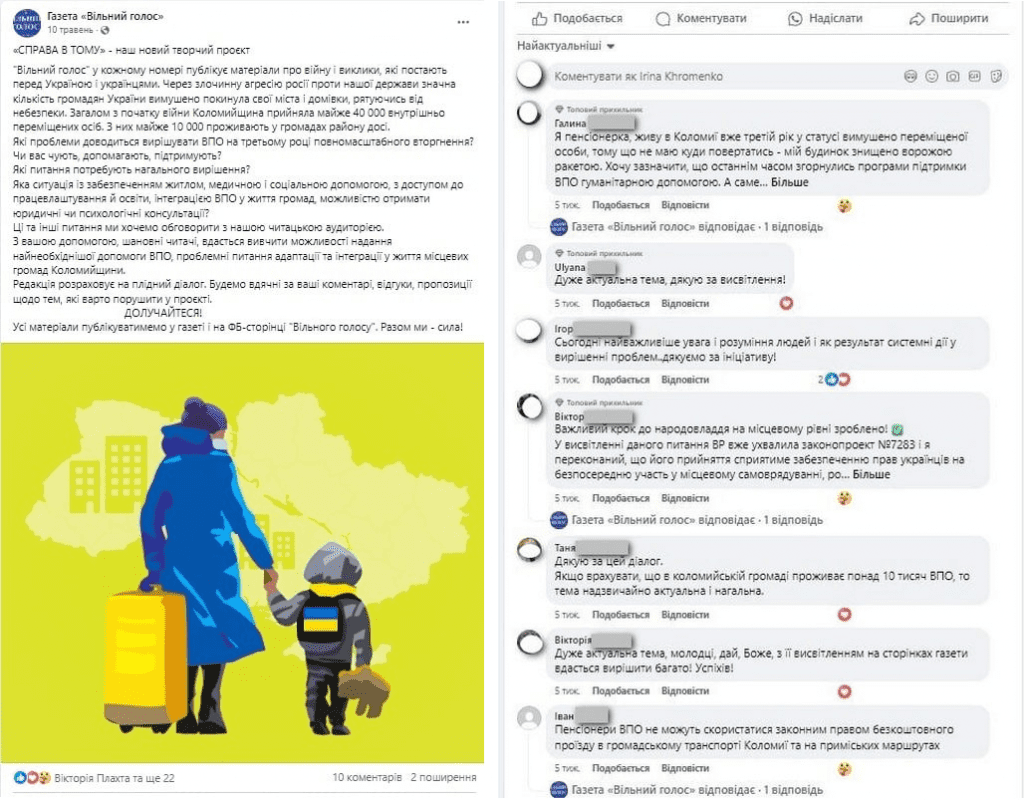
“We conducted interviews with fellow journalists who were forced to leave their small homeland and now live in Kolomyia, as well as with other immigrants. IDP readers wrote about their needs in the comments, called the newsroom, came,” said the director of the editorial board of the Vilnyi Holos newspaper, Valentyna Blyzniuk.
According to the results of the project, which was named The Matter In That…, special permanent sections appeared in the newspaper, in particular Legal Assistance For IDPs, Ask A Psychologist, and Get A Job. During the work on the project, the number of newspaper subscribers (+ 70) and readers of the Vilnyi Holos Facebook page increased (more than +160).
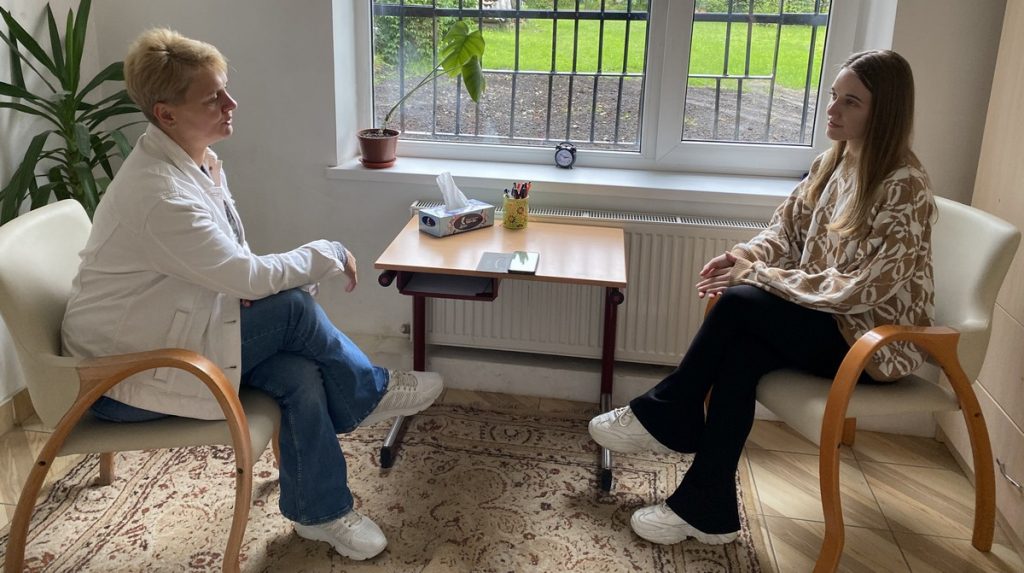
“So, the media offered interesting topics related to cooperation with their audience,” says the President of the NUJU, Sergiy Tomilenko. “In particular, they provide an opportunity for ordinary citizens of the city and region to express their opinion on urgent issues in their region. In addition, the media generally explain the tools of interaction between the authorities and citizens. Video surveys, organization of hotlines, correspondence and other types of contact with readers are becoming interesting directions. The project turned out to be extremely interesting, and almost all of its participants plan to continue the successful work with the audience and local communities in the future.”
Over the period of two months, a total of 21 local and regional media, on the initiative of the NUJU, will implement their own projects aimed at strengthening interaction with the audience and communities of local communities. Within the framework of work on projects, newsrooms receive assistance from the Ukrainian Media Fund with the help of the German Marshall Fund of the United States. TV and radio companies, online media and print publications took part in the project.
NUJU Information Service

 THE NATIONAL UNION OF
JOURNALISTS OF UKRAINE
THE NATIONAL UNION OF
JOURNALISTS OF UKRAINE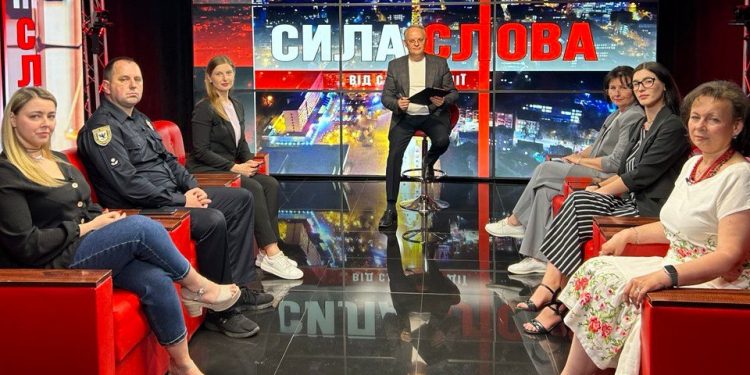
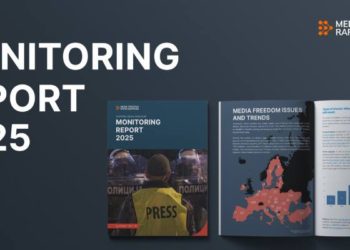
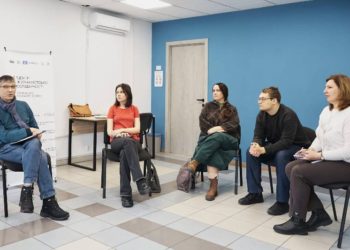
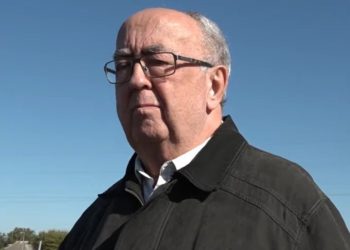













Discussion about this post